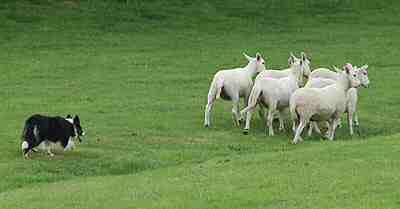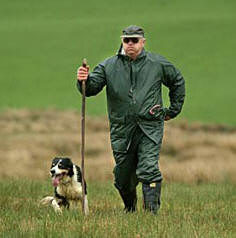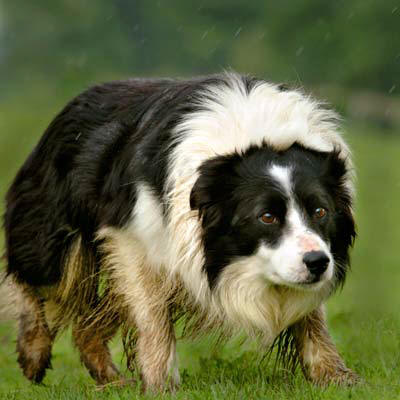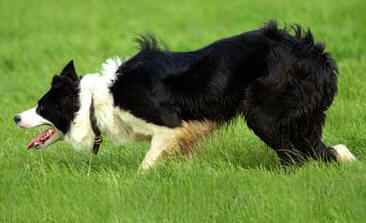What is Your Border Collie NOT Good At?
Understanding the collie brain... |
 |
|
- Cope with the presence of strange dogs
Apart from the familiar dogs with similar characteristics that live on the farm with them, working sheepdogs are unlikely to need to mix with other dogs. As pet owners we expect them to meet a lot of strange dogs, many with appalling “dog manners”, and often with our dog on lead so that it does not have the option of running away. Even if your collie does not react aggressively in these situations he could well be very stressed.
Many sheepdogs will never leave their farms so traditionally they haven't really needed to get on with other dogs or unfamiliar people. Sociability and resilience are not characteristics that have historically been important in the development of the Border Collie.
Although your dog may not be directly from working stock, it will still have many of the characteristics inherited from generations of working sheep dogs and equally he may not have inherited those characteristics that would make life in a pet home easier for him.
Shepherds are the experts with Border Collies and we can learn a lot from them. Yes, we've all heard of harsh and callous shepherds, but many value their dogs very highly, not just as working dogs but also as members of their family.
 Watch a sheepdog working
Watch a sheepdog workingIt is referring back to the shepherd for guidance all the time. His impulses to chase and control movement are under very tight control. The shepherd is guiding the dog and the dog is exhibiting self-control. Ideally, this is how we want our collie to be with us. If he is checking in with us to find out what to do next, not only is he under control and less likely to get himself into trouble, but he is also getting reassurance from us. He doesn't have to worry. We will tell him what to do in any situation. Encourage your dog to look to you for guidance. It shouldn't be too hard. It's in his genes!
 Watch the shepherd, too
Watch the shepherd, tooYou just don't see excitable shepherds. An excitable shepherd would mean an excited dog and scattered sheep! Be a calm owner. Think about this if you are considering Agility or Flyball with your Collie. A good working sheep dog is fast and has lightning reflexes, but is not in a state of over-excitement. Teach your dog calmly what you want him to do. If he understands and is enjoying what he is doing, he will do his best. After all he has been bred from generations of dogs selected for their willingness to work as a team with their handler. There is no need for your dog to be roused to a hysterical state for it to perform well, and it is bad for its mental and physical health to be in such a state. If your dog shows signs of stress or gets over-excited ask yourself if this is really the best activity for him.
A final thought
When a working sheepdog is not working alongside the shepherd he is shut away in a quiet, non-stimulating place to rest and recover and to keep him out of mischief! Importantly, adrenalin levels that have probably been quite high while he is working now have a chance to return to normal. Your sensitive, alert pet Collie is being bombarded with information from his environment all the time. Make sure he has plenty of opportunity to rest in a secure, non-stimulating place where he can relax.
When a working sheepdog is not working alongside the shepherd he is shut away in a quiet, non-stimulating place to rest and recover and to keep him out of mischief! Importantly, adrenalin levels that have probably been quite high while he is working now have a chance to return to normal. Your sensitive, alert pet Collie is being bombarded with information from his environment all the time. Make sure he has plenty of opportunity to rest in a secure, non-stimulating place where he can relax.
Think Border Collies, think working sheepdogs... maximise their strengths, understand and respect their weaknesses.
Author credit...
Sue Kinchin has owned and trained a variety of dogs including BOrder Collies for over 30 years. She's had adolescent rescue collies and also collie pups from the age of eight weeks. At the moment, she owns two Border Collies - 12 year old Mist and 7 year old Glen, both from working stock. As a keen hill walker in the past, she has always had an interest in working collies and a particular interest in how they fare in pet homes.
Sue Kinchin has owned and trained a variety of dogs including BOrder Collies for over 30 years. She's had adolescent rescue collies and also collie pups from the age of eight weeks. At the moment, she owns two Border Collies - 12 year old Mist and 7 year old Glen, both from working stock. As a keen hill walker in the past, she has always had an interest in working collies and a particular interest in how they fare in pet homes.
Currently Sue instructs at pet dog training classes and she does one-to-one training and behaviour consultations. Recently she started holding Border Collie evenings for owners of pet collies who need advice on collie ownership and activities to keep their collies occupied, but calm.
Sue is a member of the APDT 00922.
For more information, email: suekinchin@btinternet.com
Photos with kind permission of Andy Nickless: The Working Sheepdog Web site
You can see more wonderful images of Border Collie Sheepdogs - Off Duty on Andy's DVD. Available from Agility Warehouse
First published: 07/11/10 When Lee Windeatt first started training his Border collie Shy, he fell for the myth that agility dogs had to be hyped up around the agility ring to be competitive. So he followed everyone else and hyped her up. He's now have learnt his lesson and attempts to do the opposite. When he came across the following article by Sue Kinchin, he was so impressed with the sentiment behind it that he asked the author if he could share in with other agility folk in order to give them a better understanding of their collie. Although we write 'collie brain,' we are sure the underlying principles apply to most breeds to some extent.
When Lee Windeatt first started training his Border collie Shy, he fell for the myth that agility dogs had to be hyped up around the agility ring to be competitive. So he followed everyone else and hyped her up. He's now have learnt his lesson and attempts to do the opposite. When he came across the following article by Sue Kinchin, he was so impressed with the sentiment behind it that he asked the author if he could share in with other agility folk in order to give them a better understanding of their collie. Although we write 'collie brain,' we are sure the underlying principles apply to most breeds to some extent.
No comments:
Post a Comment